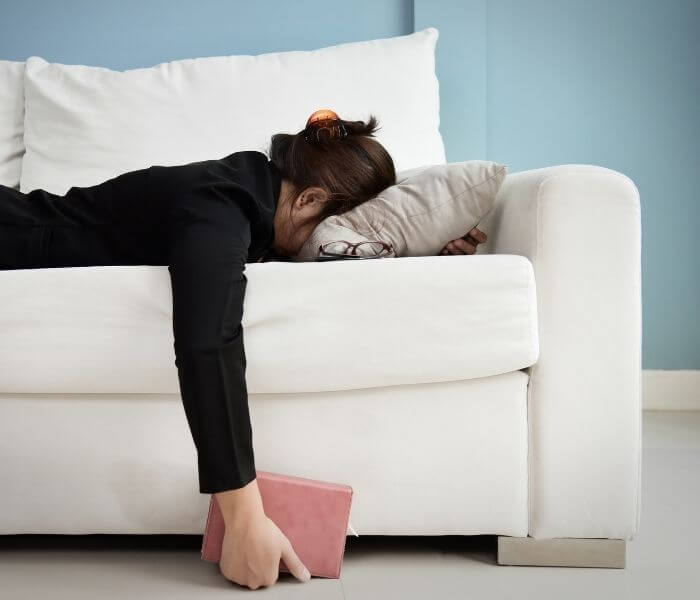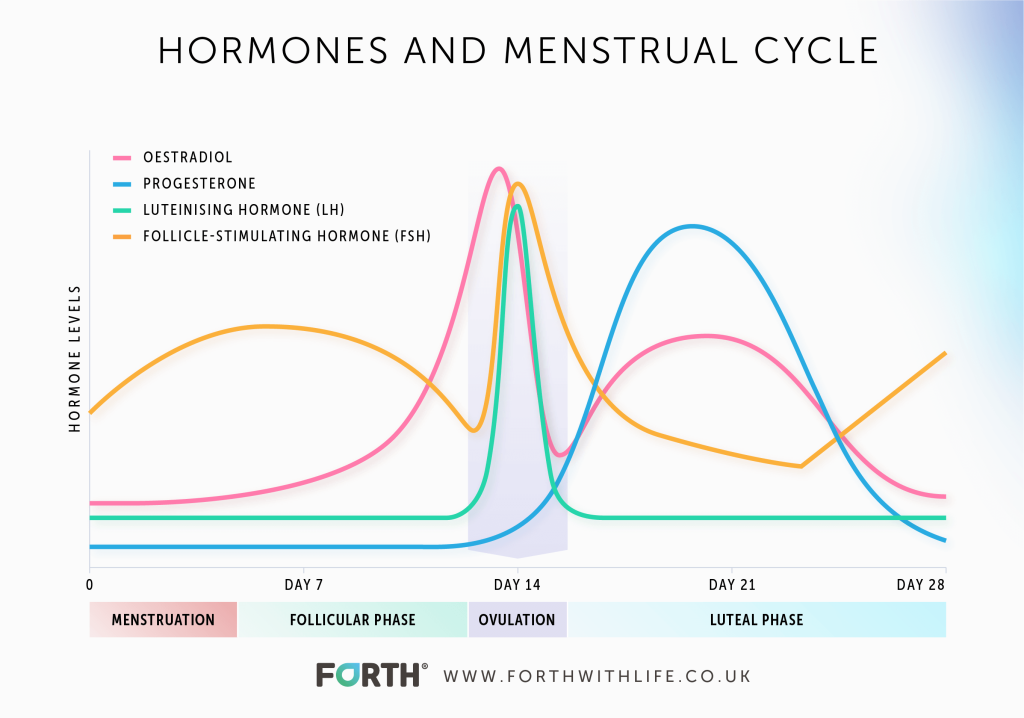8 mins read
Low Energy Levels in Women: Causes and Solutions

Being a woman is complex. Governed by hormones and menstrual cycles, it can be difficult to know whether you are coming or going at times. Your metabolic function and energy are no exception to the rule and can be affected by fluctuating hormone levels or specific lifestyle choices.
It’s perfectly normal to feel energised and ready for exercise one day and feel like you can’t be bothered the next day. The reason for this is physiological. For women, fluctuating hormone levels happen in line with their menstrual cycle. This can have implications for their desire to exercise, their metabolism, and recovery post-exercise.
That’s not all, there are conditions that are more prominent in women than men that also affect energy levels, such as thyroid problems.
Understanding the fluctuations in hormone levels during the menstrual cycle can help you to boost your energy levels. Let’s look at some of the causes and the things you can do to help keep your body revitalised and ready for the day’s challenges.
View our Wellness Tests and start your journey to better health today
What Causes Low Energy In Women?
Feeling like you have no energy or are tired all the time isn’t just a symptom of a hectic lifestyle. Instead, it may be an underlying health issue that may need to be addressed or boosting your energy levels may be achieved by making some small changes to your daily routine.
Hormones
A woman’s menstrual cycle can be split into two phases, follicular and luteal. The follicular phase occurs on days 1-14, beginning on the first day of a woman’s period. It’s during this phase that the hormones oestrogen and progesterone are at their lowest, meaning that exercise will feel easier and recovery times will be quicker. As the phase progresses to around day 12, oestrogen and luteinising hormone rise and this causes an egg to be released from the ovaries, a process called ovulation. And it’s at this time, when these hormones are peaking, some women may find they have increased energy. Part of the reason for this is oestrogen promotes the availability of sugar (glucose) to your muscles [1].

The second phase, the luteal phase is where there is a peak in progesterone levels, and this causes your resting heart rate to rise and aerobic capacity to decline. You’ll probably feel hot and bothered, and exercise might feel like you’re on a never-ending treadmill. This phase of the cycle can be a good time for some women to do lower intensity exercise. That’s because progesterone can make glucose less available to your muscles meaning they tire easily.
The key here is to listen to your body, every woman is an individual and each woman has her own unique menstrual cycle. So do what you feel is right for you during each phase.

Lifestyle
Hormones are not the only factor when it comes to decreased energy levels, life, in general, has a major part to play, too. For example, diet, exercise, weight, busy working lives and running the home can all contribute to daily fatigue.
Working, whether you go out to work for a paid job or carry out the necessary duties to keep the home running, can mean that your attention is shifted away from eating the right, healthy foods and getting good exercise, ultimately impacting your general lifestyle and energy levels. A study carried out by the ONS in 2018 found that women had 5 hours less free time than men due to women carrying out more unpaid work such as childcare and household chores.
A poor diet can prevent the body from obtaining the vital nutrients it needs to function properly. Deficiencies in some vitamins such as vitamin D, folate, B12 and iron and cause low energy levels and fatigue.

Conditions
If neither of the above applies to you and you’re still wondering why you have low energy, then you may have an underlying condition.
Tiredness is a common symptom of diabetes and can be caused by both high and low blood sugar levels.
Feeling fatigued is also a common symptom of an underactive thyroid, also known as hypothyroidism. The thyroid is a small butterfly-shaped gland in the neck that produces the hormones which regulate your metabolism [3]. If you have an underactive thyroid, then the gland does not produce enough of these hormones. This means the cells in the body work at a slower rate than usual, resulting in symptoms such as tiredness, weight gain, and muscle aches [4].
How Women Can Improve Energy Levels
Lots of women just accept feeling tired, fatigued, or lacking energy as the norm, the price you pay for the combination of a busy, work, home, and social life. That’s not strictly true, there are things you can do to help manage your energy levels.
Hormones
If your menstrual cycle is playing havoc with your energy levels, then try using the different phases to your advantage. Remember, during the early stage of the follicular phase, your hormone levels are low, so try low cardio exercise, anything that doesn’t require loads of stamina. As your cycle continues into the ovulation stage, now is the time for HIIT or circuit training because your energy levels will be peaking. During the luteal phase, your hormones will be dropping, so light-moderate exercises will be best.
A hormone imbalance may also be causing low energy levels and fatigue, so checking that your hormones are fluctuating as expected for your age would help identify any issues.
If you regularly experience heavy periods, then it may be useful to check for iron deficiency. Low iron levels are associated with fatigue and can affect your ability to carry out your daily tasks effectively as well as lower your exercise capacity. Be careful too, if you complete lots of endurance activities and you’re at menstruating age, this type of exercise can also induce iron deficiency and fatigue, so you may also want to consider testing yourself [5].

Lifestyle
When it comes to your lifestyle, diet is key to managing your energy levels. There are specific nutrients women must make sure they incorporate into their diet, such as:
- Vitamin B12 – low levels of this nutrient can cause a specific type of anaemia which can make you feel tired and weak [6].
- Vitamin D – this nutrient is essential for bone health, but deficiency can also cause fatigue [7].
- Creatine – a supplement that may help women to sustain better energy levels during high-intensity workouts.
- Folate – helps the body to make red blood cells which carry oxygen around the body, essential for energy [8].
- Iron – also needed for healthy red blood cells and to maintain their oxygen-carrying capacity.
- Magnesium – essential for muscle and nerve functions as well as supporting the immune system.
You check for nutrition deficiencies in our Nutricheck test.
It’s also important to avoid blood sugar spikes and maintain blood glucose levels within a safe range, especially if your fatigue is a result of diabetes or prediabetes. You can help to keep your blood sugar levels in check by gently exercising more often like walking, lowering your carbohydrate intake, snacking less, and eating more fruit and veg.
Conditions
If you’re concerned your constant lack of energy may be because of an underlying condition, such as diabetes or thyroid problems, then a simple blood test can be taken to identify the cause or rule out these conditions. Why not try one of our home blood tests if you are concerned your low energy levels may be related to a condition?
Our blood tests that could help explain why you feel fatigued are:
Conclusion
For many women, fatigue is a common daily occurrence that many blame on their busy schedules but it could be so much more. Lacking energy is a natural occurrence during the female menstrual cycle because of the fluctuating hormone levels. Understanding and tracking your cycle can help you to plan your exercise and utilise it to get the most out of your body, without overdoing it and adding to your tiredness.
Lifestyle choices can also be a major contributor to feeling tired all the time. Busy work lives and hectic home lives can mean you take your eye off the ball when it comes to diet, exercise and even your weight. Taking a moment to analyse where you can make some small changes can make a big difference to the way you’re feeling. It’s also worth ruling out common underlying health conditions like diabetes and an underactive thyroid, as these are common culprits for fatigue.
Article references
-
Oosthuyse, T and Bosch, A, N. (2010). The Effect of the Menstrual Cycle on Exercise Metabolism: Implications for Exercise Performance in Eumenorrheic Women. Sports Med: 40(3), pp 207-27.
-
Wouthuyzen-Bakker, M. (2015). Exercise-Induced Anaemia: A Forgotten Case of Iron Deficiency Anaemia in Young Adults. Br J Gen Pract: 65(634), pp 268-269.
-
Stabler, S, P. Vitamin B12 Deficiency. The New England Journal of Medicine: 368, pp 149-60.
-
Ecemis, G, C and Atmaca, A. (2013). Quality of Life is Impaired Not Only in Vitamin D Deficient but Also in Vitamin D-Insufficient Pre-Menopausal Women. J Endocrinol Invest: 36(8), pp 622-7.
This information has been medically written by Dr Thom Phillips
Thom works in NHS general practice and has a decade of experience working in both male and female elite sport. He has a background in exercise physiology and has published research into fatigue biomarkers.

Dr Thom Phillips
Head of Clinical Services
Related articles
Like this article? Here are some more based on similar topics.




